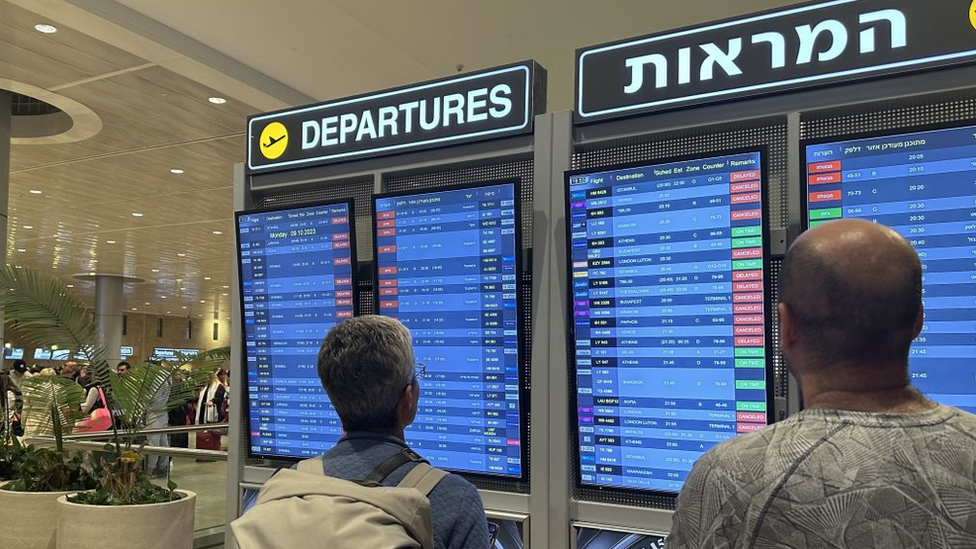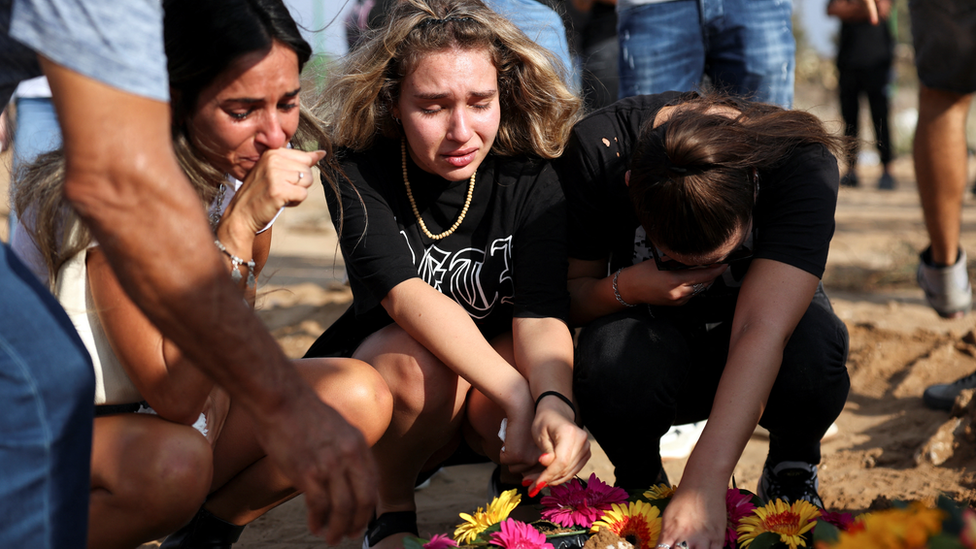People struggle to leave Israel as flights book up
- Published

Securing direct flights from Israel to the UK has become increasingly difficult with more airlines cancelling flights after the Hamas attacks.
Virgin is now operating one flight to and from Tel Aviv a day instead of two and BA is flying one round trip.
EasyJet, Ryanair, Wizz Air, Air France, Lufthansa and Emirates have suspended flights from Israel into the UK.
One travel agent said he been "inundated" with calls from people trying to get flights back to the UK.
Jeremy Segel, director of West End Travel, which specialises in trips to Israel, said many flights were booked up with only the "odd seat" available.
He arrived back in the UK on Monday with his family who had travelled as part of a 44-strong group to celebrate the Jewish festival of Sukkot.
While his BA flight was delayed, Mr Segel told the BBC people were "panicking" in Ben Gurion Airport as they learned of flights being cancelled. At one stage, "everyone started running" in the airport over a false alarm of an attack.
"People are very nervous, people are very defensive," he said.
BA's website shows that its earliest flight to the UK from Ben Gurion Airport is on Monday 16 October and a one-way ticket costing more than £1,300. For the following Monday, a ticket is about £226.
Virgin Atlantic and Israel's national carrier El Al - which is still operating two flights daily to London Heathrow and two to Luton Airport - have no availability on their UK-bound services until next week.
Several airlines have introduced flexible booking policies and allowed customers to change travel dates for free.
Flightradar24, a website which tracks flights, told the BBC many airlines had cancelled journeys due to safety concerns. But it pointed out that the airspace over Israel isn't closed, so the number of flights flying to or from Tel Aviv "is currently down to individual operators".
Despite a dwindling number of direct flights leaving Israel, Foreign Secretary, James Cleverly, urged UK nationals wishing to leave to use commercial transport, with no UK government evacuation currently planned.
The Foreign Office is advising against all but essential travel to Israel and the Occupied Palestinian Territories,, external and against all travel to certain parts of the region.
"There are air flights, and of course there are land borders with friendly nations - with Egypt, with Jordan," Mr Cleverly said. "If you seek to leave Israel we are working with the air industry and with Israeli air traffic control to maintain those flights."
'What are we supposed to do?'
One woman from London, who asked the BBC to withhold her name, remains in Tel Aviv along with her husband, another adult couple and 12 children.
She said the group was "going through a lot of trauma" and had been forced to search for places to hide when air-raid sirens had sounded. The children especially were "shaking from fear".
"I can't tell you about the fear we are living through," she said. "We have been trying to contact anyone to get us home."
She said she had tried to call the British Embassy in Israel but had received no reply.
"We are very disappointed as we live in England and no one is willing to help us get back safely," she said. "What are we supposed to do in this time of war?"
Asked if the government's policy on not currently facilitating an evacuation from Israel for UK citizens could change, Mr Cleverly said the situation in Israel was "very fast moving".
"I'm not able to speculate as to what might happen in the future."
Additional reporting from Rozina Sini.

Have your travel plans been affected by events in the Middle East? You can get in touch by emailing haveyoursay@bbc.co.uk, external.
Please include a contact number if you are willing to speak to a BBC journalist. You can also get in touch in the following ways:
WhatsApp: +44 7756 165803
Tweet: @BBC_HaveYourSay, external
Please read our terms & conditions and privacy policy
If you are reading this page and can't see the form you will need to visit the mobile version of the BBC website to submit your question or comment or you can email us at HaveYourSay@bbc.co.uk, external. Please include your name, age and location with any submission.
Related topics
- Published9 October 2023
